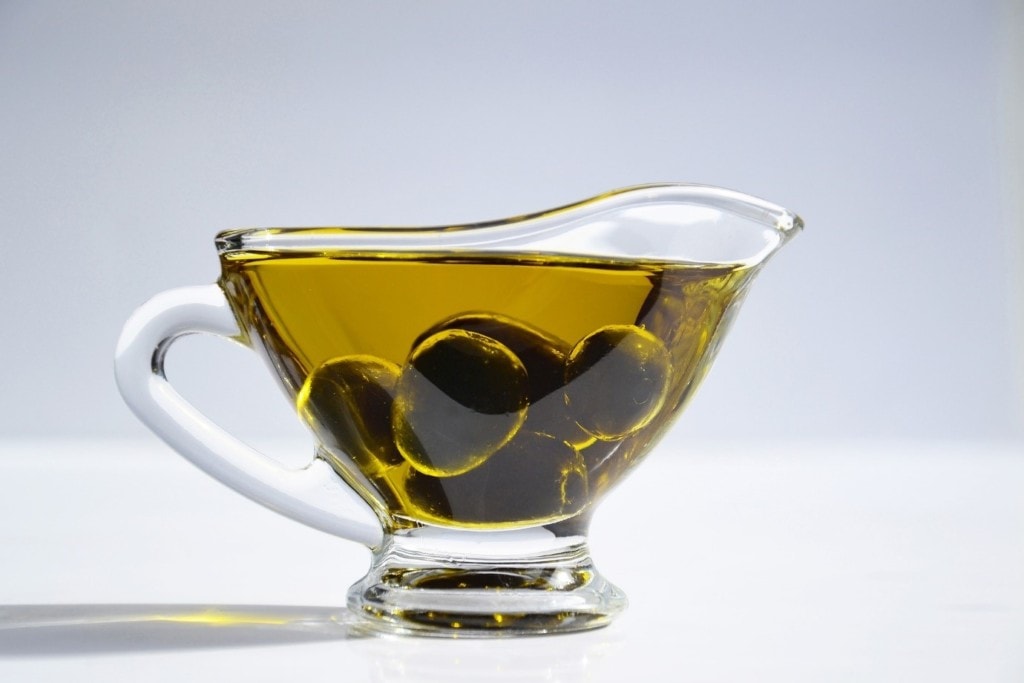Extra Virgin Olive Oil vs Avocado Oil: Which Is Healthier?
Updated June 10th 2025

Summary
- Extra virgin olive oil and Avocado Oil have different benefits depending on what you are looking for in your choice of oil.
- Extra virgin has the highest level of polyphenols, which are powerful antioxidant with multiple health benefits.
- Avocado Oil has a higher level of Omega 3 Fatty Acids.
- Extra virgin olive oil is a key element of The Mediterranean Diet – which continues to go from strength to strength in popularity and health benefits.
- It’s important to balance the unique benefits of any cooking oil before choosing what is best for your needs.
Contents
- Is Extra Virgin Olive Oil Healthier Than Avocado Oil?
- Extra Virgin Olive Oil: The Ancient Medicine
- Avocado Oil: The Versatile Nutrition Boost
- The Omega-3 Factor: Extra Virgin Olive Oil Compared To Avocado Oil
- Avocado Oil Benefits For Skin And Eye Health
- Extra Virgin Olive Oil And Heart Health Benefits
- The Verdict: Extra Virgin Olive Oil versus Avocado Oil
Is Extra Virgin Olive Oil Healthier Than Avocado Oil?
Extra virgin olive oil vs avocado oil, which one’s better for your health? Both have earned a solid place in the kitchen for their healthy fats and antioxidant content, but they aren’t the same. Whether you’re cooking or topping a salad, knowing how they compare can help you get the most from each.
Here’s how these two oils stack up.
Extra Virgin Olive Oil: The Ancient Medicine
For centuries, the Mediterranean diet has been held as a gold standard for heart health, partially due to the generous use of EVOO. Chock-full of monounsaturated fats, EVOO is famed for reducing the risk of heart disease by lowering bad cholesterol levels and increasing good cholesterol.
Not just a friend to your heart, the potent phenolic compounds in this liquid gold have anti-inflammatory properties that may protect against cancer and oxidative stress. But it’s the rich reservoir of vitamin E, a powerful antioxidant, and the potential to improve brain function wherein EVOO truly shines.
How to Choose the Best EVOO: Opt for bottles labeled “cold-pressed” and “certified organic” to ensure you’re getting the highest quality and nutritional content.
Avocado Oil: The Versatile Nutrition Boost
Avocado oil is the defatted essence of the creamy green fruit. Like EVOO, it’s a source of monounsaturated fats, which supports the cardiovascular system. Avocado oil brings something unique to the table with its high smoke point, making it ideal for all kinds of cooking methods, including high-temperature frying.
This smooth operator is also packed with lutein, an antioxidant essential for eye health, and chlorophyll, the green pigment that in some studies has been shown to reduce cancerous growth.
How to Choose the Best Avocado Oil: Look for oils that are unrefined and cold-pressed for the most health benefits.
The Omega-3 Factor: Extra Virgin Olive Oil Compared To Avocado Oil
If you’re comparing on the omega-3 front, avocado oil edges past EVOO, albeit slightly. It contains more of these essential fatty acids, crucial for reducing inflammation and aiding brain function. Both oils are low in omega-3s compared to omega-6s, so incorporating other more concentrated sources like flaxseeds and fatty fish is recommended for a balanced intake.
Avocado Oil Benefits For Skin And Eye Health
Avocado oil is known for its smooth texture and neutral flavour, but it also brings a solid nutritional profile. Just one tablespoon contains 124 calories and 14g of fat, including 2g of saturated fat. It’s rich in oleic acid, a monounsaturated fat which research suggests is linked to reduced inflammation and better heart function.
It’s also a natural source of vitamin E and lutein, both of which support skin health and eye function. This makes it a useful option for skincare and general wellness, especially for those focused on the visible benefits of healthy fats.
However, avocado oil is still high in fat. While it provides essential fatty acids, it’s best used in moderation. Anyone with an avocado, latex, or birch allergy should avoid it, and people taking blood thinners like Warfarin should check with a healthcare professional before using it regularly.
Extra Virgin Olive Oil And Heart Health Benefits
Extra virgin olive oil is a key part of the Mediterranean diet and has long been linked to a lower risk of heart disease. Like avocado oil, it’s packed with oleic acid and other monounsaturated fats, which help cut down LDL (bad cholesterol) and increase HDL (good cholesterol).
For olive oil to qualify as virgin olive oil or extra virgin olive, it has to meet strict standards:
- Cold pressed within 24 hours of harvest
- Sourced from a single origin
- Made using mechanical methods only
- Free from flavour or aroma defects
- Acidity level below 0.8%
Lower acidity means better quality and longer shelf life. Alongside monounsaturated fats, extra virgin olive oil also includes polyphenols, oleuropein, and vitamin E, a combination that helps support heart, brain, and bone health.
The majority of he fat content in EVOO comes from heart-healthy monounsaturated fats, with only small amounts of polyunsaturated fats. That balance makes virgin olive oil a better option for replacing saturated fats found in products like butter or coconut oil.

Smoke Point, Skin Health, and Nutritional Advantages
Extra virgin olive oil has a smoke point of about 405°F, so it works well for roasting, sautéing, or drizzling, but it’s not the best choice for stir frying or cooking at a higher smoke point. In those cases, avocado oil, which handles more heat, is a good alternative.
Both oils support skin health, but virgin olive oil may have an advantage when it comes to disease prevention. It delivers more polyphenols and vitamin E than avocado oil and has a strong record in research around long-term health benefits.
Also, the fat profile in extra virgin olive oil helps your body absorb fat soluble vitamins more efficiently. That means you’re not just getting healthy fats, you’re helping your body use nutrients better too.
When it comes to avocado oil and olive oil, both play a role in a balanced diet. If you can, go for cold-pressed oils as they retain more nutrients and antioxidants.
That’s All There Is To Know About These Cooking Oils – Try For Yourself!
You don’t need a full diet overhaul to get the benefits. Just start by adding olive oil to salads, vegetables, or grilled fish. With its monounsaturated fats, essential fatty acids, and rich taste, cold pressed extra virgin olive oil is one of the simplest ways to support your health while boosting flavour.
Whether you’re replacing saturated fats in your cooking or looking for a way to enrich your meals with unsaturated fatty acids, the health benefits of extra virgin olive oil make it a strong everyday choice.
Use both oils depending on what you’re cooking, olive oil for flavour and antioxidants, and avocado oil for high-heat needs. Together, they cover all bases.
The Verdict: Extra Virgin Olive Oil Versus Avocado Oil
Both EVOO and avocado oil boast impressive health profiles, but they cater to slightly different needs. EVOO, as an essential part of the Mediterranean diet, takes the limelight with its robust heart benefits and antioxidative prowess. Meanwhile, avocado oil’s versatility and slightly higher omega-3 content make it a formidable contender.
The best strategy? Incorporate both oils into your cooking and dietary repertoire. Salad dressings beg for the fruity notes of EVOO, while avocado oil’s buttery richness elevates any cook’s repertoire. Understanding your cooking method and recipe can guide you towards choosing the ideal oil for your next culinary adventure.
Remember, moderation is key. While these oils bring bounties for your well-being, excessive use can still contribute to calorie overload, so pour wisely. Whether it’s a drizzle or a sizzle, let the health benefits of these oils make their way into your kitchen and onto your plate. It’s not just about the oil you choose, but how you use it that counts.
Extra virgin olive oil is made from the first cold pressing of olives and is packed full of health boosting antioxidants, or polyphenols. It’s also rich in mono-saturated fats, which can help to lower cholesterol levels. Avocado oil, on the other hand, is made from the flesh of avocados and has a milder flavor. It’s also a good source of vitamins E and K, as well as omega-3 fatty acids.
So, what are the health benefits of these two oils? Extra virgin olive oil has been shown to reduce the risk of heart disease and stroke. Avocado oil, meanwhile, can help to improve cholesterol levels and provide relief from arthritis symptoms. According to a great new summary from Tasting Table, both oils are an excellent addition to your larder. But, looking into their properties in more details shows some key health benefits of extra virgin olive oil and avocado oil.
